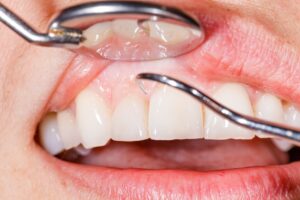
Did you know that according to the CDC, nearly half (47%) of all American adults 30 years or older have some form of gum disease? Not only that, but it’s also listed as the leading cause of tooth loss. Catching it early can prevent it from progressing to maintain your dental well-being, but it’s natural to wonder what happens if it’s already reached a more advanced stage. Is it possible to reverse the damage caused by your periodontal problems?
Many patients who are worried about gum disease aren’t sure what steps to take to keep it from getting worse. Continue reading to learn more about how it’s resolved and why it’s important to get help quickly!
Can Gum Disease Be Cured?
Gum disease occurs when harmful bacteria build a layer of plaque between teeth and along the gumline. Over time, germs can penetrate below the surface and cause an infection. The earliest stage can usually be treated and reversed to keep it from evolving. Once it’s reached a certain point, however, you’ll require a professional’s help to protect, preserve, or restore your gums.
Below are more detailed descriptions of each level of periodontal disease and how it’s typically addressed.
Gingivitis
This is the first stage and often goes unnoticed because it’s easy to miss the early indicators of a problem. You might notice your gums are darker, swollen, or bleed slightly during your daily dental hygiene routine.
Fortunately, at this early phase, the disease can be turned around relatively easily. If you don’t already, you should brush and floss twice daily to remove bacteria. Also, you should schedule a visit with your periodontist so they can professionally clean your mouth to ensure the disease doesn’t advance.
Mild Periodontitis
If your gingivitis goes unnoticed or untreated, then you’ll develop mild periodontitis. At this level, the infection deepens and affects the connective tissue. More thorough brushing won’t hinder its progress at this point, so you’ll need to visit your periodontist. After an examination, they can recommend appropriate solutions. In many cases, scaling and root planing can remove tartar from above and below your gumline.
Moderate Periodontitis
Plenty of people don’t realize they have a problem until it reaches this point because symptoms become more noticeable. You will notice that your gums begin to pull away from your teeth to avoid the infection. This forms pockets beneath your gumline where germs can flourish, exacerbating your condition.
In addition to receding gums, you’ll likely experience:
- Gum tenderness
- Bleeding
- Bad breath
- Bite alignment issues
Your periodontist may be able to halt additional progression with scaling and root planing, but surgery is often required at this point.
Severe Periodontitis
In this final phase, there’s been so much damage to your gum tissue and jawbone that your teeth no longer have a firm foundation. They may grow loose or fall out altogether, which can alter both your appearance and your oral health. Without roots to stimulate new bone growth, your jaw begins to weaken. Eventually, this can change your facial structure and lead to additional tooth loss.
This form of gum disease usually requires surgery to clean and reduce bacteria-filled pockets from between your teeth and under your gums. Also, a bone graft may be recommended to bulk up your jawbone to maintain your dental well-being.
The best way to avoid tooth loss from gum disease is to prevent it from occurring in the first place. Consistently cleaning your teeth and gums and regularly visiting your periodontist can provide peace of mind because you’re not as likely to develop a problem!
About the Practice
At Utah Implants & Periodontics, patients benefit from two dedicated specialists who offer a wide range of services to maintain healthy smiles. Whether you need a cleaning for preventative care or have more severe gum disease requiring more complex treatments, they can help. They give each person their full attention, so you never feel rushed or ignored. Plus, they utilize state-of-the-art technology for enhanced comfort and accuracy. If you’re worried about periodontal problems and need an appointment, you can request one on the website or by calling (801) 322-5032.
